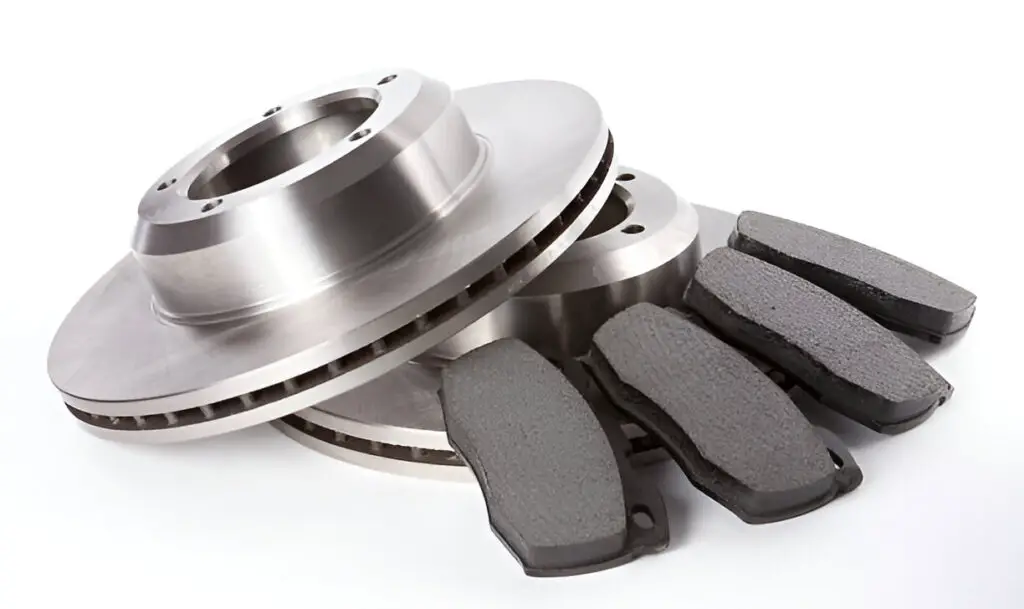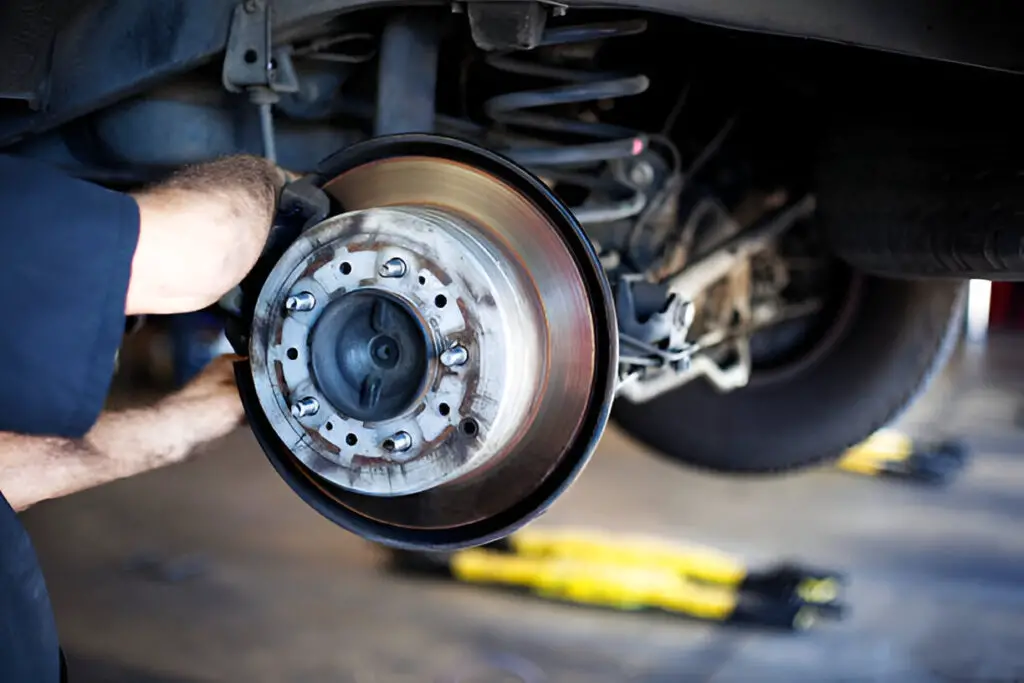After replacing brake pads, some noise is normal during the initial break-in period as the new pads adjust to the rotors. However, persistent squeaking, grinding, or clicking sounds may indicate improper installation, low-quality pads, or issues with the rotors or calipers.
Replacing brake pads is one of the most common and necessary maintenance tasks for any vehicle, ensuring safe and effective braking. However, many drivers experience an unexpected issue after this routine service-unusual noises coming from their brakes. Whether it’s a squeak, squeal, or grind, these sounds can be alarming, especially when they occur right after new brake pads are installed.
While some noise may be normal during the bedding-in process, persistent or loud sounds may indicate underlying problems that require attention. This blog delves into the reasons why noise occurs after brake pad replacement, how to troubleshoot and fix it, and what steps you can take to prevent it in the future.

Contents
Brake System
Before diving into the causes of noise, it’s essential to understand the basic components involved in the braking process:
- Brake Pads: These are the friction material that press against the brake rotors to slow down your car. Over time, they wear out and need to be replaced.
- Brake Rotors (Discs): The rotors are metal discs connected to the wheels, and they work in tandem with the brake pads to stop the car.
- Brake Calipers: The calipers house the brake pads and push them against the rotors when you apply the brakes.
When any of these components are worn or improperly installed, they can cause noise, especially after replacing the brake pads.
Causes of Noise After Brake Pad Replacement
Here are the common causes of noise after brake pad replacement:
1. New Pad Material Needs Breaking In (Bedding-in)
One of the most common reasons for noise after brake pad replacement is that the new pads simply need time to bed in. The bedding-in process allows the pad material to transfer to the rotor, creating an even surface for consistent braking.
Solution: Bedding in your brake pads involves a series of slow and moderate braking events. This process typically takes 300-500 miles. During this period, some noise (like squealing or squeaking) is normal. Follow the manufacturer’s guidelines to avoid premature wear.
2. Type of Brake Pad Material
Different brake pad materials can make varying levels of noise:
- Semi-metallic brake pads: These are durable but tend to be noisier because they contain metal fibers that can produce grinding or squeaking sounds.
- Ceramic brake pads: These are quieter but can still produce squealing if not properly bedded or if contaminants like dust accumulate on them.
Solution: If the noise is bothersome and consistent, you may want to switch to a different pad material, such as ceramic pads, which tend to produce less noise compared to semi-metallic ones.
3. Improper Installation
Even experienced mechanics can occasionally make mistakes during installation. Loose calipers or poorly seated pads can lead to noise:
- Rattling noise: could indicate that the brake pad is not secured correctly in the caliper.
- Grinding or knocking sounds: may result from incorrectly torqued bolts or other loose hardware.
Solution: Take your car back to the mechanic and ask them to check for loose parts or improper installation. Ensuring all bolts and clips are correctly installed and tightened can eliminate this source of noise.
4. Worn or Damaged Brake Hardware
When replacing brake pads, it’s essential to inspect the brake hardware (such as clips, springs, and pins). Over time, these components can become worn or damaged, contributing to unwanted noises. Old hardware that is not replaced can cause the pads to move excessively, leading to clicking or rattling sounds.
Solution: Always replace worn hardware when installing new brake pads. This ensures the pads remain stable and eliminates noise caused by movement or vibrations.
5. Warped or Glazed Rotors
If the brake rotors are warped or have developed a glazed surface, they won’t interact properly with the new brake pads. Warping occurs due to excessive heat during braking, and glazing happens when the brake pad material overheats, leaving a smooth, shiny surface on the rotor.
- Warped rotors often lead to a pulsating noise when braking.
- Glazed rotors cause a high-pitched squealing or squeaking noise.
Solution: Rotors should be resurfaced (machined) or replaced if they are severely warped or glazed. A smooth rotor surface allows the brake pads to make even contact, minimizing noise.
6. Lack of Lubrication
Brake calipers need to be lubricated to ensure smooth operation. If the slide pins or the back of the pads are not properly lubricated, friction between the components can cause squeaking or grinding noises. A common area missed during installation is the contact points between the pads and caliper.
Solution: Apply brake lubricant to the back of the brake pads, caliper slides, and contact points to eliminate unnecessary friction. Be sure not to apply lubricant to the friction surface of the pads or rotors, as this will reduce braking performance.
7. Dust and Debris
Brake pads and rotors are exposed to dirt, debris, and brake dust over time. Accumulation of these particles can lead to squeaking, especially right after new pads are installed, as the material may be “settling.”
Solution: Ensure that both the pads and rotors are clean during installation. If you notice noise after installation, have your mechanic clean the pads and rotors with a brake cleaner.

How to Diagnose Noise After Brake Pad Replacement
Understanding the type of noise your brakes are making is critical in diagnosing the issue. Here’s a quick guide:
- Squeaking: Typically caused by dirty or glazed brake pads, lack of lubrication, or the need for bedding in.
- Grinding: This could indicate metal-to-metal contact, possibly due to worn-out rotors or improper installation.
- Clicking or Rattling: Often caused by loose brake hardware or improperly installed pads.
- Pulsating Noise: This can occur if the rotors are warped or have uneven surfaces.
Preventing Noise After Brake Pad Replacement
Here are some best practices to prevent noise after replacing your brake pads:
- Choose Quality Brake Pads: Invest in high-quality pads made from durable materials that reduce noise and wear, like ceramic pads.
- Inspect and Replace Hardware: Always check the condition of brake hardware and replace it if necessary during pad installation.
- Brake in the Pads Properly: Follow the bedding-in process recommended by the manufacturer.
- Lubricate Properly: Apply brake grease to the appropriate components to ensure smooth and quiet braking.
- Keep Components Clean: Ensure the rotors and pads are free of debris and brake dust during installation.
Frequently Asked Questions
Here are some FAQs about noise after brake pad replacement –
1. Is it normal for brakes to make noise after being replaced?
Yes, it can be normal for brakes to make some noise right after replacement. This is typically due to the new pads and rotors bedding in. Noise should subside after a short period of use, usually after driving 300-500 miles.
2. How long does it take for new brake pads to bed in?
The bedding-in process usually takes 300-500 miles of driving under normal conditions. During this time, you may hear squeaking or squealing noises, which should diminish as the pads settle against the rotors.
3. What should I do if my new brake pads are still noisy after bedding in?
If the noise persists after the bedding-in period, it could indicate a problem such as improper installation, worn hardware, or issues with the rotor. In this case, it’s best to have your brakes inspected by a professional.
4. Can I drive with noisy brakes?
While minor noise during the bedding-in process is normal, persistent noise should be addressed. Ignoring unusual sounds can lead to further damage to your braking system, such as worn-out rotors or hardware failure.
5. Why do my new brake pads grind when braking?
Grinding noises usually indicate metal-to-metal contact. This could happen if the rotors are damaged, warped, or improperly installed. It’s important to have your braking system inspected immediately if you hear grinding.
Conclusion
Noise after brake pad replacement is not uncommon, and most of the time, it’s a minor issue that resolves after the bedding-in process. However, persistent noise could signal underlying problems like improper installation, rotor issues, or worn brake hardware. By understanding the potential causes and knowing when to take action, you can ensure your braking system remains safe, effective, and quiet.
If you’re still unsure, don’t hesitate to consult a professional mechanic to diagnose and fix the issue. After all, your brakes are one of the most critical safety features of your vehicle.